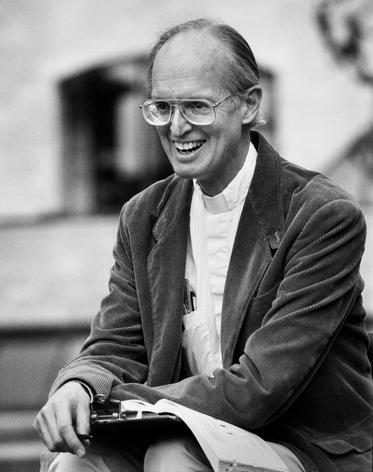The Rev. David Smith, founding director of the Justice and Peace Studies program at the University of St. Thomas, will concelebrate the 50th anniversary of his and three classmates' ordination to the priesthood at a Mass on Pentecost Sunday, June 8, at the Church of Corpus Christi in Roseville.
Smith will concelebrate the 11:30 a.m. Mass with classmates the Rev. Ronald Bowers, the Rev. Robert Nygaard and the Rev. John Parkos. The Mass is open to the public, but the lunch that will follow is by invitation only due to space limitations. The four request no gifts.

The Rev. David Smith (Photo by Mark Jensen)
All four priests served at Corpus Christi in various capacities. Smith was a weekend assistant at the parish from 1970 to 1973. Corpus Christi is located at 2131 Fairview Ave. N., Roseville.
Smith graduated summa cum laude in 1958 from the College of St. Thomas as a mathematics major. He was ordained in 1964 and joined the Theology Department faculty at St. Thomas six years later, serving for 37 years before retiring in 2007. Among his many honors is St. Thomas Professor of the Year, in 1995, and he is known widely as the founding director of the university’s Justice and Peace Studies program, which has offered a minor since 1987 and a major since 1991. He also was Teacher of the Year, in 1994, for the Consortium on Peace Research, Education, and Development, a national organization.
He lives on campus in the Faculty Residence, and is an avid participant in the life of the university.
To learn more about Smith, The Newsroom posed four questions:
Where were you ordained?
St. Paul Cathedral, after studies at the St. Paul Seminary from 1958 to 1964.
How did you go from being a mathematics major to becoming a priest?
Although I was doing fine as a pre-engineering student with prior approval to attend Massachusetts Institute of Technology after graduation from St. Thomas, my association with Father James Lavin (“Jumping Jim” – later called “Scooter”) and Herbert Slusser (English) convinced me that what priests do is more important than what engineers do. So I changed my pre-engineering science and math degree to a straight mathematics degree as being the most practical major for the transition. Once I began the seminary, I continued to study graduate mathematics in the summers (at Columbia University and Fordham College in New York City, and at the University of Minnesota) in case it might be useful to have a priest teach mathematics at St. Thomas College or Academy.
Where did you serve before coming to St. Thomas?
Summer deacon before ordination at St. John the Baptist, Savage; one year and eight months at Nativity of the Lord in St. Paul; four months at John the Baptist, Excelsior; one year as secretary to Archbishop Leo Binz; and three years studying in Rome at the Angelicum for a doctorate in theology. Later I did further studies at Catholic University in Washington, D.C., (1973-74, Hebrew and Greek), and at the École Biblique et Archeologique Française in Jerusalem (1974-76 Sacred Scripture: degree by examination before the Pontifical Commission in the Vatican).
What was your inspiration for founding the Justice and Peace Studies program?
Archbishop John Roach, as head of the U.S. Conference of Catholic Bishops, had appointed the committee and shepherded its work to write the 1983 pastoral letter “The Challenge of Peace: God’s Promise and Our Response.” At that time, President Ronald Reagan was expanding our offensive nuclear missiles and proposing to station them in Europe. Two years after the letter was published, Archbishop Roach asked Father Terrence Murphy, president of St. Thomas, what “you guys” were doing about the letter. Murphy appointed Robert Conlin of Sociology to do something; Conlin appointed a committee (on which I served) widely representing the college, and we studied what to do about the letter. We soon decided that a program offering at least a minor was necessary. After agreeing on what topics such a minor should be sure to include, several of us suggested ways to package that content into courses. My suggestions were accepted, but only after I assured the committee that I could teach the courses – what eventually became Theology 421 Theologies of Justice and Peace and JPST 250 Introduction to Justice and Peace Studies. The minor was approved in the spring of 1987, and I spent the fall of that year on sabbatical traveling to other schools to review their programs. It was expanded to a major in 1991. The general pattern of both minor and major was based on Roman Catholic social teaching (especially papal encyclicals and the Second Vatican Council), the “circle of praxis” of liberation theology (which I confirmed as appropriate in a fall 1988 sabbatical in Latin America), and active nonviolence to promote the structural changes necessary for justice and peace.






